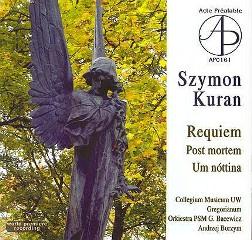Szymon Kuran - Requiem (2000)
Szymon Kuran - Requiem (2000)

1. Requiem (2:33) 2. Kyrie (1:08) 3. Dies Irae (6:44) 4. Oratorio (2:29) 5. Rex tremandae (1:21) 6. Confutatis (0:48) 7. Lacrimosa (2:54) 8. Offertorium (3:53) 9. Sanctus - Benedictus (1:08) 10. Agnus Dei (3:02) 11. Oratio (1:26) 12. Lux aeterna - Communio (8:53) 13. Post Mortem 4:13 Choir – Chór Chlopieço-Meşki Gregorianum, Chór Kameralny Collegium Musicum Uniwersytetu Warszawskiego Conductor – Andrzej Borzym Electric Guitar – Tomasz Kania Flute – Urszula Janik Orchestra – Orkiestra Państwowej Szkoly Muzycznej II st. nr 3 w Warszawie im. Grażyny Bacewicz Percussion – Barbara Skoczyńska, Krzysztof Jedlewski Violin – Joanna Hajduk, Marek Wroński Voice [Maiden] – Urszula Borzym
Requiem was composed in Iceland from 1994 to 2000 in memory of Brynhildur Sigurdardóttir, who died of cancer in 1994. The work is performed by a child singing solo, three choirs of boys, women and men, a violin, flute, guitar, string ensemble and percussion. The text of Requiem is sung in Latin with the exception of a prayer (nr. 11 Oratio), sung in Polish.
Szymon Kuran (16/12/1955 - 07/08/2005), a Polish violist and composer. He was born in Poland and has lived in Iceland since 1984. In his compositions Szymon Kuran aims to achieve clarity of form, and a transparent and timeless musical language. In the mind of the composer, the composition is related to hope, and the believe that nothing is without its purpose.
Szymon Kuran started early learning to play the violin in his native Poland. At first he was taught by his father and later he studied under the guidance of many respected teachers in his native country. After completing his studies he became consertmaster of the Baltic Philharmonic Orchestra. Later he continued his studies in London. In 1984 he was employed as second concertmaster of the Icelandic Symphony Orchestra and has worked in that capacity since. He has also performed as a soloist and engaged in composing. His compositions have for example been played by the Icelandic Symphony Orchestra. Szymon Kuran has also played jazz music and made several recordings. ---requiemsurvey.org
Szymon Kuran died at forty-nine. He was a violinist, principally active as orchestral leader both in his native Poland and later in Iceland, but also a soloist. He gave the Icelandic premieres of both the Panufnik Concerto and Szymanowski’s First. Interested in jazz he formed a "string jazz" quartet, which recorded and was much admired. And he also composed. He was made Artist of the Year in Reykjavik in 1994.
These are the merest essential details of a regrettably short life. This disc is also on the short side at forty-three minutes but it does present Kuran’s biggest and most important classical composition, his Requiem. And now it serves that melancholy duty for its composer. It was written between 1994 and 2000. The text is in Latin – there’s a short interpolated prayer in Polish – and it’s written for three choirs (children’s, male and female), strings, percussion, and an eclectic array of other instruments including electric guitar. There’s a strong role for the solo violin, a role that the composer would have taken himself on disc had not fate decreed otherwise.
The Requiem is a most approachable, tonal work. Perhaps a near reference point, though I stress "near," is Arvo Pärt – the deep Russian sounding basses in the opening movement certainly reinforce the impression. It’s a work of humility and humanity as well, with bells used warmly and the solo violin sweetly in the Dies irae – mostly in reverie, and with folk influenced melodic lines. In the Rex tremendae we hear some terse and stern percussive statements and implacable men’s voices but the consoling Lacrimosa – all women’s voices and coiling smoke violin - acts as balm. There are hints of Brahms’s own German Requiem in the Offertorium and in the percussion-dominated Sanctus-Benedictus it’s more a case of Pärt once more and maybe Gorecki. The girl’s solo voice in the Oratio II is joined by the once-more-active solo violin; the work ends in consoling quietude.
Post mortem is a brief work, lasting less than four minutes, written for solo violin and string orchestra and dedicated to the victims of the Gdansk attacks in 1981. A serene Bach Chorale-like theme is assailed by skittering high strings but there is a measure of resolution at the end. Um nóttina was written in the same year as the Requiem. It’s rapt, otherworldly, reflective and refined – a sort of stripped down Vasks.
This is a noble salute to Kuran. The Requiem was recorded live whilst the companion works were taped in the studio. All the performances are impressively assured and the notes are sympathetic. There is no jazz here, for those who may know Kuran from his quartet work. His classical compositions are serious but gently affirmative. ---Jonathan Woolf, www.musicweb-international.com
download (mp3 @320 kbs):
yandex mediafire uloz.to cloudmailru gett








